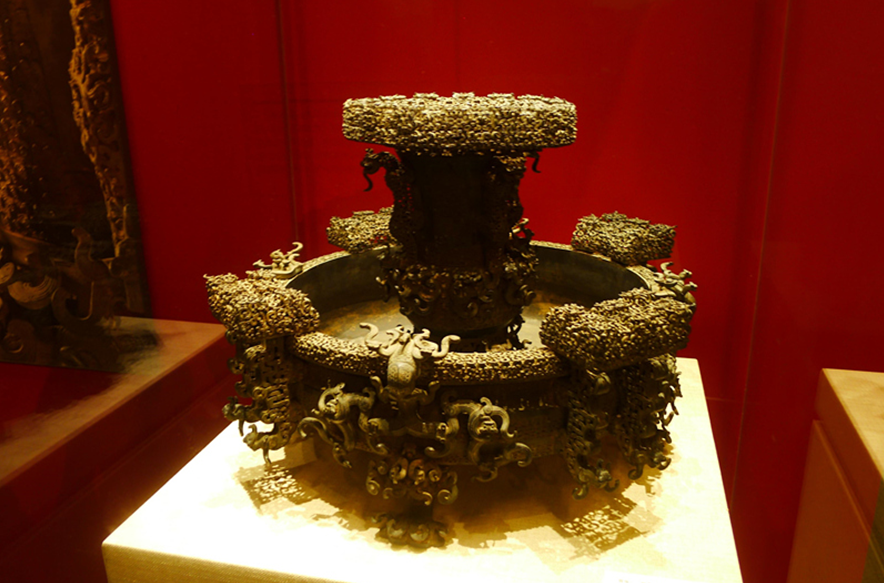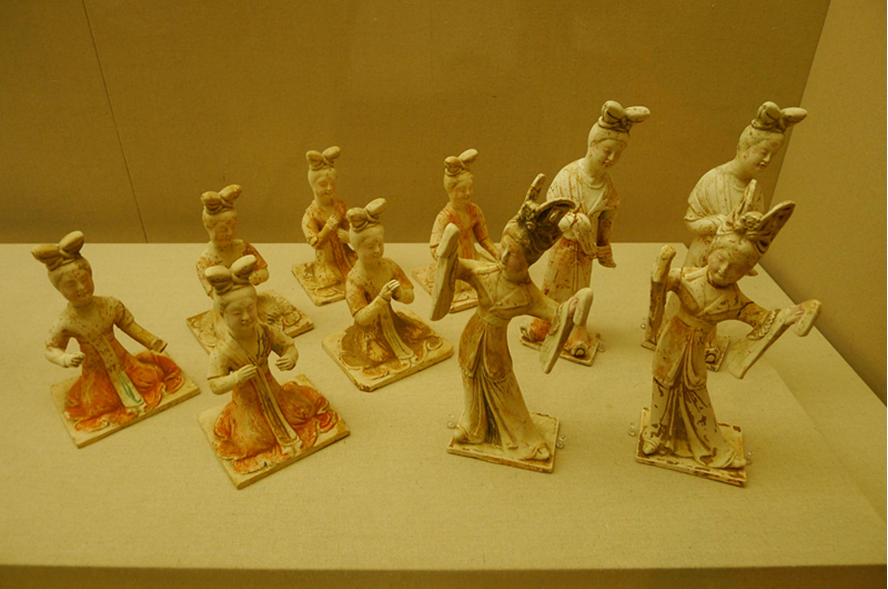


Exhibitsshowing on display “The Splendor of Asia: An exhibit of Asian Civilizations,” which opened on Monday May 13 at Beijing’s National Museum of China. Photo by HeLuqi from People’s Daily online
An exhibit featuring 451 cultural relics from 47 Asian countries and Greece and Egypt opened on May 13 at Beijing’s National Museum of China ahead of the Conference on Dialogue of Asian Civilizations (CDAC), which organizers said aims to highlight the time-enduring communication and “harmony in diversity” of different civilizations.
Organized by China’s National Cultural Heritage Administration (NCHA) and the Ministry of Culture and Tourism (MCT), the exhibit, with the theme, “The Splendor of Asia: An Exhibit of Asian Civilizations,” is part of a series of cultural activities in the run-up to the CDAC starting on May 15 in Beijing.
Among the relics is a religious statue as part of the collection of India’s National Museum. Forty-six diplomatic gifts from Asian countries to China are also on display, such as a painting called “Silk Road” sent by Uzbekistan, according to a press release the NCHA provided to the Global Times.
The exhibit’s scale is unprecedented in terms of participating countries, number of relics on display and fineness of the treasures, which can be called an “Olympics of relics,” the statement said.
Organizers and Chinese observers lauded the exhibit, which provides rich evidence of how civilizations communicated and learned from each other.
Liu Zheng, a member of the China Cultural Relics Academy, told the Global Times that ancient relics, carrying the spirit of civilizations, tell people stories of how our ancestors communicated “in a most vivid and convincing fashion.”
Greece and Egypt, which represent two ancient civilizations, were also invited to the exhibit, which is a great opportunity for visitors to see the cultures that have close ties with Asia through the ancient Silk Road trading routes, Liu said.
These artworks taught us that “clashing was never the mainstream when civilizations make contact,” said Liu. Different civilizations could coexist and “harmony in diversity” calls for concerted efforts, which will lead to the prosperity of human civilization, he said. The event would not have been possible without the close cooperation of different departments from various countries, Liu said, noting that China’s progress in archaeology and relics restoration has won Asian countries’ trust to handle their ancient treasures for the special exhibit.
Aside from the exhibit, the Asian civilization week also features cultural events during the CDAC, which include parades, cultural performances, and the Asian Film and TV Week, MCT said on its website.
Geng Shuang, spokesperson of China’s Foreign Ministry, said at a routine press conference on May 13that China holds the CDAC in hopes to through such platform showcase Asian civilizations, boost exchanges and mutual learning between different civilizations and promote cooperation between different countries.
Respect for the diversity of civilizations is an important prerequisite for safeguarding world peace and harmony. Conducting a dialogue of civilizations is an important guarantee for the peaceful coexistence of all countries in the world, Geng noted.
Liu said the holding of the exhibit in itself is a concrete example of cooperation among Asian countries, especially those along the Belt and Road Initiative on culture protection.
The core values of Asian civilizations displayed in this exhibit, dialogue and mutual learning are also seen in the BRI, a framework for economic and cultural cooperation and exchanges, Liu noted.

Exhibits showing on display “The Splendor of Asia: An exhibit of Asian Civilizations,” which opened on Monday May 13 at Beijing’s National Museum of China. Photo by HeLuqi from People’s Daily online

 Award-winning photos show poverty reduction achievements in NE China's Jilin province
Award-winning photos show poverty reduction achievements in NE China's Jilin province People dance to greet advent of New Year in Ameiqituo Town, Guizhou
People dance to greet advent of New Year in Ameiqituo Town, Guizhou Fire brigade in Shanghai holds group wedding
Fire brigade in Shanghai holds group wedding Tourists enjoy ice sculptures in Datan Town, north China
Tourists enjoy ice sculptures in Datan Town, north China Sunset scenery of Dayan Pagoda in Xi'an
Sunset scenery of Dayan Pagoda in Xi'an Tourists have fun at scenic spot in Nanlong Town, NW China
Tourists have fun at scenic spot in Nanlong Town, NW China Harbin attracts tourists by making best use of ice in winter
Harbin attracts tourists by making best use of ice in winter In pics: FIS Alpine Ski Women's World Cup Slalom
In pics: FIS Alpine Ski Women's World Cup Slalom Black-necked cranes rest at reservoir in Lhunzhub County, Lhasa
Black-necked cranes rest at reservoir in Lhunzhub County, Lhasa China's FAST telescope will be available to foreign scientists in April
China's FAST telescope will be available to foreign scientists in April